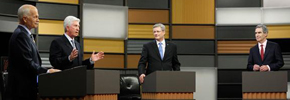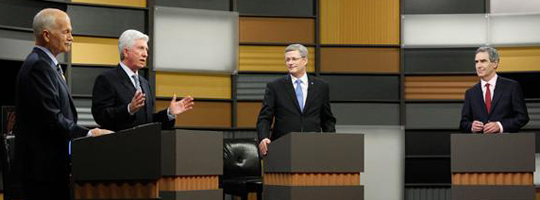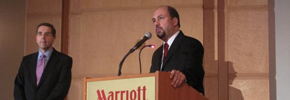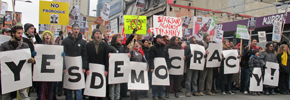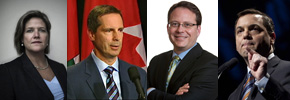Sima Sahar Zerehi – Maybe it’s a cultural thing. We Tehrantonians are used to a good heated argument – shouting back and forth from the front and back seat of a cab; exchanging words accompanied by wild gestures while waiting for our Kabobs in the line at Super Tehran; or talking back to the editorial columns while energetically flipping through the pages of the weekly paper.
It’s the same in our homes, take my family for instance, arguing is our primary form of communication. Sitting around the breakfast table on Sunday morning, everything gets debated, politics, literature, even the weather, and to get in on the action, you have to raise your voice, free your hands, declare your position and prepare to defend it.
The highest form of flattery in our community is to have someone else deem you worthy of a debate, consider you an equal in a battle of words and wits, and to honour you with their “A” game.
For us debates are the Olympics of politics. They separate the real contenders from the herd. So with the enthusiasm of sports-fans watching the playoffs, we readied ourselves for the English language televised debates on Tuesday evening.
The debate included four of the five Federal Party leaders, Conservative Leader Stephen Harper, NDP Leader Jack Layton, Bloc Quebecois Leader Gilles Duceppe and Liberal Leader Michael Ignatieff.
Green Party Leader Elizabeth May, the only woman in the group, was barred from participating in the debate, although she did succeed in sharing her views via live blogging and tweeting.
There was even greater anticipation leading up to this event, as this debate was going to finally offer a format that would allow the participants to directly engage with one another. The exchange was going to expose the true nature of our leaders when stripped of their political crutches and forced to look each other square in the eye.
We all had bets and bragging rights riding on our predictions on the evening’s winners and losers.
It was agreed that an adequate debater attracts the crowd’s attention, a good debater is able to pull people into the argument and garner greater interest for the issues at hand, a great debater can ignite the flames of passion, and a master debater can win the hearts and minds of the people.
There’s plenty of room to criticise, so let’s start with the debate accolades: Bloc Quebecois Leader Gilles Duceppe was in my view the shining light in the evening. From the onset, he got the crowd sitting up and paying attention with his scrappy and poignant verbal repartee.
Duceppe, who was the one debater not speaking in his native tongue, was able to masterfully dominate the first half of the discussion with his timely interventions and stinging remarks.
He started off the debate on a high by remarking: “I would first want to congratulate Mr. Harper for answering a question from a citizen for the first time in this campaign,” calling attention to Harper’s tightly controlled rallies on the campaign trail.
From the onset of the debate, Duceppe bombarded Harper with a series of questions regarding the Auditor General’s report that allegedly indicates that the Conservative government misled parliament to gain approval for a $50 million fund for questionable projects related to the G8 and G20 summits.
In the second part of the debate, Duceppe’s xenophobic remarks regarding immigration in Quebec and Bill 101 did tarnish his shiny veneer for many ethnic voters.
He lost me at “multiculturalism doesn’t fit with Quebec.” A statement that seems nonsensical when considering francophone immigrants from various parts of the world including North Africa.
Although Duceppe started strong he seemed to run out of steam in the second half of the debate and receded into the background by the end of the evening, conceding his position as the evening’s best debater.
Michael Ignatieff quickly joined the game in the first part of the debate firing a series of nicely crafted phrases designed to highlight Harper’s failures while in government.
From his initial remarks in the debate to the post-debate media scrum, Ignatieff was well armed with made for TV phrases.
Some highlights of the Iggy zingers include, his remarks on why the Conservatives have not been able to secure a majority: “Mr. Harper you haven’t earned a majority, majorities are things you earn.”
His “A Few Good Men” inspired slight against Harper on why an election has been called, “we’re having and election because you can’t tell the truth.”
And his comments on how Harper has been able to use parliamentary manoeuvring to avoid opposition to his agenda “anything you can’t control, you want to shut down.” Variations of this remark were made concerning the Kairos funding as well as the prorogation of Parliament.
Ignatieff also had some choice words on the national gun registry issue in relation to violence against women, he stated, “women get killed with long guns, short guns, they don’t care.”
One of Ignatieff’s most used phrases in the night was his “Jets, jails and corporate taxes line” highlighting the priorities for the Harper government.
The Ignatieff that showed up to the debate on Tuesday night was a far cry from the mild-mannered, even-tempered, academic that we had seen in the past, this Iggy was fired up and ready for a fight.
Unfortunately, he might have been a bit too well armed with ready-made quotes. While Ignatieff’s mannerism suggested a sense of urgency and investment in the debate, his contrived quotes seemed artificial and likened his arguments to a staged performance.
In the end, Ignatieff’s showed that even when you can see the politician outside the press release you might not be able to take the message box out of the politician.
In our culture, politely waiting your turn to take part in an argument is a tell tale signs of an amateur debater, as it will mean that you will be surely sidelined by more aggressive opponents.
The assumption is that if you have something to say, and need to say it desperately enough, you’ll fight for your right to speak.
As such, Jack Layton lost many points in the first half of the debate, in fact if it wasn’t for the wide screen shots, some viewers might have even forgotten that he was a participant.
Although late, Layton did perform adequately in the debate, appearing confident and at ease, while not arrogant or dispassionate.
In his face-off with Duceppe regarding immigration Layton made a grab for our hearts and minds by evoking family-reunification and mentioning his Chinese mother-in-law and wife Olivia Chow.
In regards to expediting family reunification he stated, “there are cases when grandparents pass away before they can come and hold their grandchild, that is wrong.”
On immigration issues, Layton also attacked Harper’s policies by noting that the Conservative’s “focus on immigrants as this economic unit.”
Layton also succeeded in getting-in a few good jabs at Ignatieff regarding tax-cuts by stating, “you’re Mr. Harper’s best friend,” showcasing the complacency of the Liberals in the Conservative tax regime.
Layton also called to question Ignatieff’s commitment to his job by pointing out that the Liberal leader missed 70% of the votes in the House of Commons.
Despite, a few good lines and the evocation of Tommy Douglas the NDP leader also known as the father of Medicare, Layton never made enough gains in the second half of the debate to compensate for his absence in the onset. However, although he didn’t succeed in securing the position of the best debater he did come off as the most likeable and sympathetic personality.
In a culture where people are passionate about arguing being aloof, too cool, too calm are signs of disrespect. They indicate a lack of investment in the issues, an emotional detachment and a sense of contempt towards ones opponents.
Stephen Harper’s mannerism at the debate was a clear sign of that form of contempt to the democratic process. Throughout the debate Harper refused to look directly at his opponents when addressing their remarks, he merely glanced at them from time to time.
In fact Harper’s participation in the debate more closely resembled the delivery of a monologue than an exchange of ideas with others. Harper delivered most of his remarks while looking directly into the camera, dismissing his opponents and speaking directly to the viewers.
On many occasions he dismissed the debate as “bickering” and he constantly warned Canadians that the only way to avoid a fifth election was to vote for a Conservative majority.
It’s hard to lie when looking at people directly in the eye, but Harper demonstrated that it is apparently not hard to lie when staring into a camera broadcasting to all of Canada.
From his first remark, Harper distorted and misled Canadians while all the time calmly looking directly at the lens.
Harper did not flinch when heralding his government’s immigration policy as “an open door immigration policy,” and he seemed quite at ease when speaking about the “increase of settlement funding.”
Similarly, in response to the first question of the debate regarding corporate tax cuts, Harper stated, “There are no corporate tax reductions in our current budget.”
While Duceppe did not call attention to this contradiction in his response to Harper, Green Leader Elizabeth May, blogged and tweeted her comments to Canadians on the Internet.
She noted, “This government has cut them steadily and plans to do so again from 16.5 per cent this year to 15 per cent next year.”
May interjected during the immigration discussion, she noted “backlogs in the immigration system grew under the Harper government because they have failed to re-appoint people to the Immigration Appeal Boards.”
May also made some poignant comments on the lack of questions and comments regarding key environmental concerns, including Canada’s failure to implement a plan regarding global warming.
Although no single debater succeeded in capturing the hearts and minds of Canadians, the debate did succeed in showing the electorate another side of the leaders.
Personally, I would have liked to see less scripted performances and more spontaneous engagement with the arguments at hand. I would have also liked to see Harper try to speak to his opponents as though they were worth his time.
I am not sure if the debate will be seen as a turning point in this election, but that is something that can only be determined in time.

